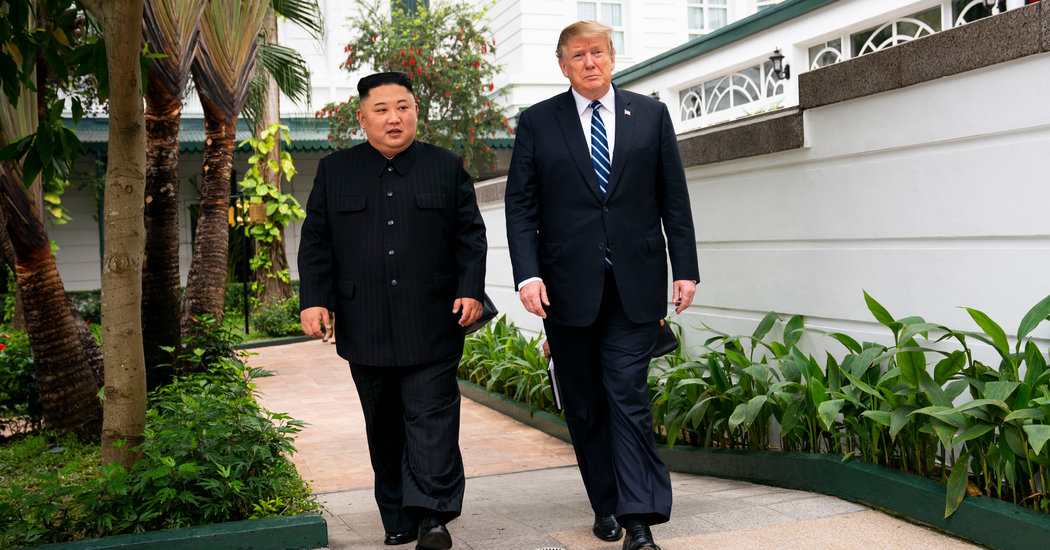U.S./DPRK Hanoi Summit Official Failure, Though Signs of Rapprochement By Jun Kwon and Sung Jang
The result of the second summit meeting between Donald Trump and Kim Jong-un in Hanoi ended abruptly and earlier than scheduled. There was no agreement reached between the two parties. Considering the symbolic success of the first summit in Singapore, the lack of a concrete conclusion of the second summit leaves many questions regarding what happened and why.
Confusion has resulted from contradicting accounts by both parties. According to President Trump, the the U.S. walked away from the negotiations because the DPRK wanted “sanctions lifted in their entirety” and “they were willing to denuke a large portion of the areas that we wanted, but we couldn’t give up all of the sanctions for that.”
A statement released by a DPRK minister Ri stated this was not the case. Rather, the DPRK’s demands were to lift five out of the eleven U.N. sanctions on DPRK from 2016 to 2017 in exchange for the permanent and complete destruction of the Yongbyon nuclear facility in the DPRK currently under U.S. supervision. Ri further stated the U.S. wanted the DPRK to have further denuclearization steps as part of this summit, though he did not specify what those steps were.
Photo by Doug Mills/NY Times
What does this mean?
Considering there was no agreement for the conclusion of the summit between the U.S. and the DPRK, it may be considered a failure for most people due to the expectations of tangible agreements. At the same time, if one takes into consideration how the tone of the conversation between the U.S. and the DPRK has changed, the second summit in Hanoi should be considered a modest success towards mutual understanding between the U.S. and the DPRK. A gap still exists between the U.S.’s and the DPRK’s understanding of the denuclearization process, but this summit has provided a very good opportunity for both parties to understand what exactly the other side wanted for the deal.
Saying that the DPRK does not wish to denuclearize would be an oversimplified analysis of the summit. The DPRK’s willingness to decommission its Yongbyon nuclear facility for the partial removal of U.N. sanctions shows its commitment to denuclearization. DPRK is a regime that relies heavily in symbolism in politics, both in the domestic arena and in foreign policy. The decommissioning of Yongbyon, the heart of their nuclear program, is certainly a signal that they are willing to commit to substantial denuclearization.
Trump’s press conference after the summit was also telling of how Trump views the DPRK. While he stated that the main point of contention was how far the U.S. was willing to lift sanctions in exchange for denuclearization in North Korea, there was a lack of abrasiveness, which Trump can be known for. Rather, the president emphasized potential of economic growth in the DPRK and at times even praised the North Korean people as being “strong”. He also stated that he was not considering putting more sanctions on North Korea due to the summit failure.
Despite the setback in Hanoi, the two states have expressed hope for continued conversation and future negotiations. The third summit is not expected anytime soon, but differences can become smaller as both countries continue to have diplomatic conversations. One could argue this is similar to the Reykjavik Summit 1986 where talks collapsed at the last minute, but ultimately paved the way for a more comprehensive Intermediate-Range Nuclear Force Treaty of 1987.
How to move forward
The U.S. and DPRK must not lose momentum or be discouraged by the failure of the Hanoi Summit. Both nations have expressed willingness to continue dialogue on this issue. Furthermore, outside encouragement, especially from South Korea’s President Moon Jae-in will add to the warming of relations between the U.S. and the DPRK, the same way he did to mediate the first summit between President Trump and Chairman Kim. South Korea and the U.S. have agreed to scale back annual U.S.-South Korean joint military exercises in 2019. If the U.S. is concerned about losing face on the international stage, it should also consider giving South Korea the green light to resume its joint economic ventures and cooperation with the DPRK in the Kaesong region’s industrial complex.
The U.S. and the ROK must also be wary of the Japanese attempts to stymie these talks and distract the U.S. from the end goal of DPRK’s denuclearization and the establishment of diplomatic relations. It is no secret that Japan’s Shinzo Abe has continuously lobbied Trump to raise contentious issues during Trump’s meetings with the DPRK,including the DPRK’s kidnapping of Japanese civilians for ransom. Other than wanting concessions from the DPRK, Japan’s other reason for preventing diplomatic normalization between DPRK, and the ROK and the U.S., is a matter of realpolitik. Historically speaking, Japan has always had much to gain when Korea was weak as seen during the Japanese Invasion of Joseon Korea in 1592, to the Imperialist occupation and subjugation of Korea in 1910, and the Korean War 1950, where it made money providing services to U.S. allies.
Ultimately, the U.S., DPRK, and ROK must not be distracted or disheartened by the failure of the Hanoi Summit. They must continue diplomatic talks between each other and stay focus on the main goals at hand; the denuclearization of the DPRK, the normalization of diplomatic relations, and peace on the Korean peninsula.
Jun Kwon is Chair of International Studies and Assistant Professor of Government at Utica College
Sung Jang is a government student at Utica College







